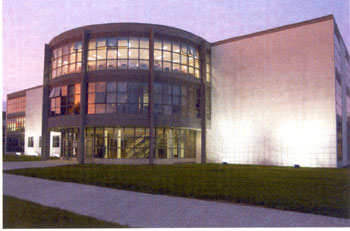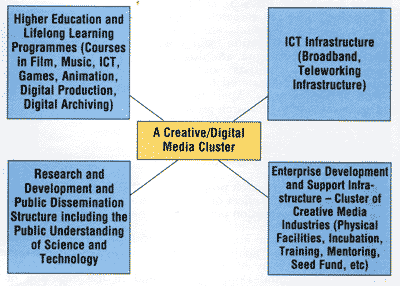| 2003 |

|
YEAR BOOK |
Dundalk Institute of Technology
|
Supporting Creative/Digital Media in the North East
|

DKIT, through the Research and Developmental endeavours of its Academic Staff, has developed a strong applied R&D reputation in Software Development, Electronics and Engineering Design, Applied Humanities, Cultural Studies, and Enterprise Development & Innovation, with new and emerging areas in the field of Renewable Energy and Creative/Digital Media. The evolution of this range of Research expertise has a direct bearing on new course development, on staff development, and on the relevance of graduate provision to the skills needs of the Regional and National economy.
Creative/Digital Media Initiative
One of the key issues for development agencies in the North East and Cross-Border region is that of increasing the quality of job opportunities - in particular, to increase the number and range of opportunities for third level graduates. The overall goal is to create a knowledge-based cluster of businesses in the Region, in a sector that has the potential to offer competitive advantage. A significant step in this direction to date has been the development of the Dundalk Chamber of Commerce-sponsored Dundalk Technology City initiative. This is an enabling forum representing all the key players - Enterprise Ireland, IDA, Dundalk Institute of Technology, F�S, Louth County Enterprise Board, and the private sector, whose objective is to provide the necessary infrastructure to support such a high tech cluster.
The findings from the recently commissioned SQW Consultants report into the feasibility of establishing a cluster of knowledge based industry in the North East region places DKIT at the core of the initiative within the first three years of development, particularly in the key areas of course development, enterprise support and development, and the development of the Public Understanding of Science and Technology.
The objective, therefore, is the creation of a cluster of creative media based enterprises and supports in the North East and Cross-Border region. In this process, it is proposed to focus on those industries which emerge from the interaction between technology and the arts, delivering firms and employment in areas such as film making; video; multimedia; computer games and animation; and music/music technology.
The proposed Creative/Digital Media Cluster will consist of four key integrated components, as follows:

Where the Arts meet Technology - developing a framework for the support and development of the creative industries sector in Ireland
Over the past decade, Ireland's enterprise support policies have focused on the manufacturing, ICT and high-technology sectors. However, a new, but somewhat untapped source of valuable entrepreneurial talent is emerging. The Creative Industries are now recognised as a key sector in the global knowledge-based economy. A recent report estimates the value of just one sector of this industry at $178 billion, a figure which is forecast to reach $434 billion per annum by 2006.
Despite the potential for significant industrial growth and economic development in this sector, creative industries in Ireland remain very understudied and not well understood. On the one hand, there is a general lack of understanding of what is meant by Creative Industries and, on the other, there is a need to apply scientific enterprise principles to the commercialisation of the very unique creative talent that typifies this particular industry.
The research project being conducted at Dundalk Institute of Technology, and funded under Strand 1 of the Technological Sector Research Support Programme, aims to identify the nature of and support and development needs of Creative Industries. The research findings will contribute to the development of a framework for harnessing, mobilising and commercialising Ireland's creative human capital, thus leading to increased levels of entrepreneurship, innovation and sustainable new businesses in this burgeoning sector of the Irish economy.
In examining this sector, the project will aim to investigate the manner in which it is both similar and different to traditional industries (including high-tech industries) and will explore the degree to which these differences should affect future policy initiatives aimed at supporting and developing creative industries in Ireland.
A primary objective in this analysis is to identify the major challenges faced by entrepreneurs and businesses in this sector, including barriers to entry, barriers to commercialisation and other mechanisms (e.g. financial) that may impede the development of creative media SMEs.
Finally, in synthesising these results and drawing on international comparisons (including research on creative industries in the UK, US, Canada, Australia and New Zealand), the project will investigate the drivers of success in this industry and the environmental factors conducive to success. These results will be used to develop a framework to aid the development of this valuable industry sector, which will include an international comparison suited to an all-island application.
Contact: Caroline O�Sullivan, Dundalk Institute of Technology; Tel: +353 42 9370354; Fax: +353-42-9331163; E-mail: [email protected] ; Web: www.dkit.ie